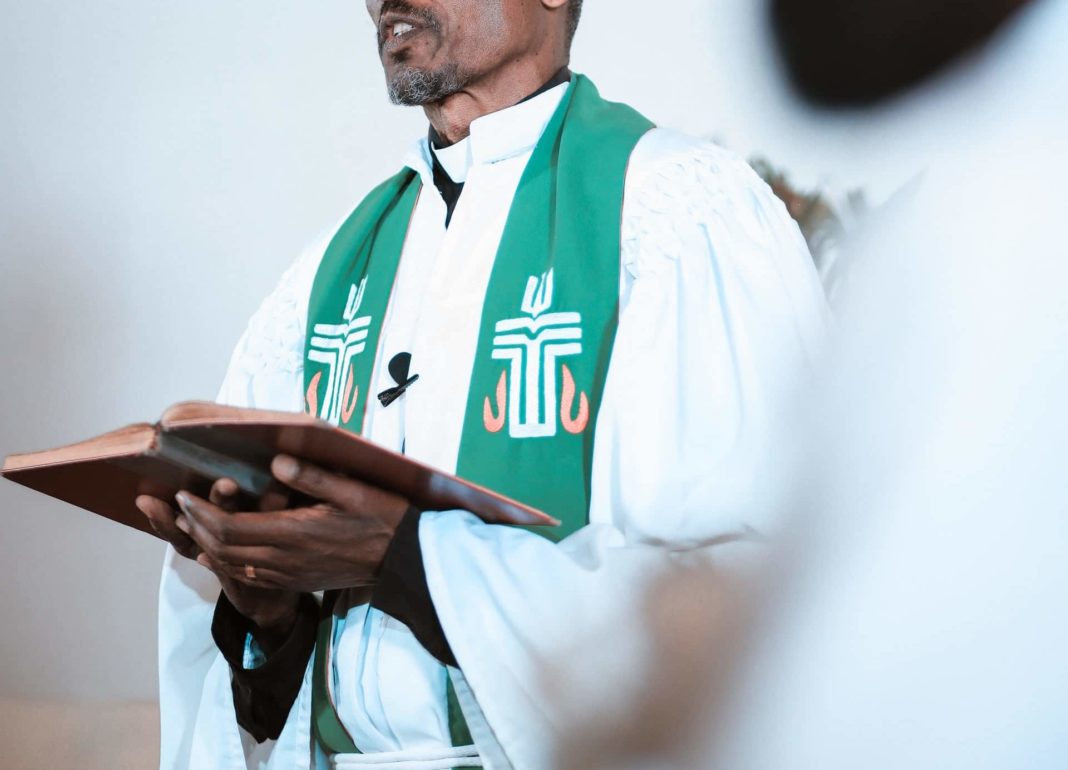In my study hangs a print of a nineteenth century painting that often adorns the studies of Presbyterian ministers or the walls of the churches where they serve. It is “The Ordination of Elders in a Scottish Kirk” by John Henry Lorimer. Lorimer, who painted scenes from nineteenth century Scottish life, captures well the simplicity yet dignity of historic Presbyterian worship. The painting depicts the conclusion of a service of the ordination of Elders. The Elders are gathered at the sides of the Communion Table, while the Minister from the behind the Table stretches out his hands in blessing, with the Bible open to Numbers 6, to the Aaronic Blessing. The Minister is dressed in what was common for Presbyterian ministers from at least the 18th into the 20th centuries: preaching gown with tabs (or “bands” as they are called in the UK) over a vest (or “waistcoat”). The black gown, has been near universal for Presbyterians and their Reformed cousins around the globe, though with some regional differences here and there (open or closed, “frogged” or plain, with or without velvet trim, etc.).
Of course, much of this is in flux today. During my own sabbatical in Scotland and Ireland, in 2019, I was struck with the growing disappearance of the black gown in many of the Presbyterian circles which I visited. In ways that parallel developments here in the USA, most of the Presbyterian ministers I met did not make use of the gown very often. It is largely gone from the Free Church of Scotland, and its presence is receding in many parishes of the Church of Scotland as well. In the Presbyterian Church in Ireland, I found a mix between those who wear the gown and those who do not, as well as those who sometimes make use of it.
On our own shores, between and within the varying Presbyterian denominations, the observer will find a wide diversity in the appearance of the preacher. Today one is as likely to find the Minister wearing an open-collar Hawaiian style shirt in the pulpit (if there is a pulpit in the room—another discussion for another day) as anything resembling Lorimer’s preacher. Whether the Baptist preacher Rick Warren began or simply adopted the practice himself, it has spread.
All this, however, begs the question about what the preacher ought to wear in worship. Of course, that further begs the question of what Presbyterians believe (or no longer believe) about the “office” of the Minister. Do we still believe in the notion of the “preaching office” or the “pastoral office”? Or have we joined the ranks of so much American “free church” congregationalism that replaces the notion of “office” with that of mere “function”? Have we dispensed with the notion of “office” only to fill the void with notions more reflective of our culture’s obsession with individual personality (displayed in gestures of “authenticity” and “transparency”)? Are we witnessing the ultimate victory of the “Levellers”?
Historically and theologically, the Reformed understanding of the church and its offices has been closer to that of other Christian traditions that have believed in an order of ministry established by Christ. While there are significant theological differences between Rome and Geneva, Calvin and his heirs nonetheless retained the conviction that the forms of the Church and its ministry derive from Christ. In this we have differed from the Radical Reformation, which understood ministry as more organically emerging out of the congregation, but not necessarily something established from the beginning. Again, while Presbyterians have differences with Anglicans over certain aspects of ministry, we do share with them a sense of a ministerial order in the Church. Or at least we have.
What does the demise of the preaching gown say about our understanding of the preaching office? Does the change in dress reflect a change in theology? Is it a sign that the notion of the ministry as a divinely established “office” is being forgotten among Presbyterians today?
